译林版七年级英语下册Unit 7 第4课时 Grammar学案
译林版英语七年级下册Unit7Grammar

• What + 形容词+名词复数 + they are 名词短语
• A.How clean the water is! • B.What clean water it is!
• A.How fine the weather is! • B.What fine weather it is!
• What + 形容词+不可数名词+ it is! 名词短语
• delicious
____H__o_w___delicious the cakes are!
strange
__H_o_w__strange the frog is!
unusual
_H__o_w_unusual the birds are!
Work out the rules:
• He runs quickly! • How quickly he runs!
4.What a clever boy! __H_o_w___ _c_l_e_v_e_r_ the boy ___is____! 5. How tall the trees are! __W__h_a_t_ tall trees ___th_e_y_ __a_r_e__! 6. What interesting books they are! _H__o_w___i_nt_e_r_es_t_in__g the books __i_s_____! 7. How funny the girl is! ___W__h_a_t_ _______ funny girl t_h_e_y_ ___a_re_!
( )3. __ hard the students are studying ! A. What B. What a C. How D. How a
牛津译林版七年级英语下册Unit7AbilitiesPeriod4Grammar教学设计

1.创设情境,引导学生通过观察、模仿、实践等方式,掌握语法知识。
2.利用多媒体教学资源,如图片、视频等,激发学生的学习兴趣,提高学习效果。
3.采用任务型教学法,设计丰富多样的课堂活动,如小组讨论、角色扮演、语法填空等,让学生在实践中掌握语法知识。
4.及时给予学生反馈,纠正错误,提高学生的语法准确性。
1.学生年龄特点:七年级学生正处于青春期,他们好奇心强,求知欲旺盛,但注意力容易分散。因此,教学活动应设计得生动有趣,以吸引学生的注意力。
2.英语水平:经过上半学期的学习,学生已具备一定的英语基础,能够进行简单的日常交流。但在语法知识方面,尤其是时态和情态动词的使用上,仍需加强练习和巩固。
3.学习兴趣:学生对英语学习充满热情,尤其对于能够表达自己能力和特长的内容感兴趣。因此,本节课的设计应紧密结合学生的兴趣,激发他们的学习动机。
4.语法讲解与练习:结合具体实例,以简洁明了的方式讲解语法规则。在讲解过程中,注意引导学生观察、总结规律,提高学生的语法意识。同时,设计针对性的练习,让学生及时巩固所学知识。
5.反馈与纠正:在教学过程中,教师应及时关注学生的学习反馈,针对学生的错误进行纠正,指导学生掌握正确的语法形式。同时,鼓励学生相互纠错,培养他们的合作意识和自主学习能力。
三、教学重难点和教学设想
(一)教学重点
1.一般现在时和现在进行时的正确运用,以及情态动词can的用法。
2.频率副词的使用,如always、usually、often、sometimes、never等。
3.能够运用所学语法知识进行句子构建和简单对话交流。
(二)教学难点
1.学生对一般现在时和现在进行时的区分,以及在实际语境中的正确运用。
牛津译林版初中《英语》七年级下册Unit4 Grammar教学设计

牛津译林版初中《英语》七年级下册Unit4 Grammar教学设计一、教学分析1. 教学内容分析。
本节课教学内容选自译林版初中《英语》七年级下册Unit4中的Grammar 板块。
语法板块主要是针对本单元出现的语言现象进行归纳与总结,通过练习与活动帮助学生了解并掌握语法规则,有助于学生进行与本单元话题相关的语言的输出。
本单元的中心话题Finding your way,讨论的是在旅行过程中如何辨别方位、根据地图识路以及为别人指路。
本课时的中心任务是结合本单元话题,创设真实语境,引导学生对冠词和方位介词的用法进行总结与运用。
2. 学生分析。
本节课授课对象为七年级学生。
经过小学的英语学习,学生已具备一定的听、说、读、写能力。
本节课的语法现象对学生而言并不陌生,但要在一节课内进行冠词和方位介词两个语法点的学习,内容偏多,想要完成并非易事。
3. 教学目标。
针对上述教学内容与学生学情的分析,设定如下教学目标:(1)知识目标:学生能够掌握冠词以及方位介词的基本用法;学生能够理解本课时的重点词汇与短语,如across、inside、outside等。
(2)能力目标:学生能够根据具体语境,使用正确的冠词来描述事物;运用方位介词来表达物体的位置。
(3)学习策略目标:学生能够通过同桌讨论、小组合作的方式,归纳冠词和方位介词的部分语法规则,提高主探究学习的能力。
(4)情感态度目标:学生能够在情景的辅助下,学会帮助他人,与他人分享快乐。
二、教学过程Step1:Lead-in教师向学生问好,询问学生今年去哪里春游的,通过向学生展示红山动物园的照片来引出话题,A trip to the zoo。
[设计意图]通过谈论学生熟悉的话题,轻松自然地导入与学生课外生活相关的话题,化解了学生的紧张情绪,调动了学生的学习积极性。
同时,导出生詞与词组,引出含有冠词的句子,让学生进一步感悟定冠词和不定冠词在具体情景下的运用,为后面的语法学习做好铺垫。
2020-2021牛津译林版英语七年级下册Unit4 Grammar 教案
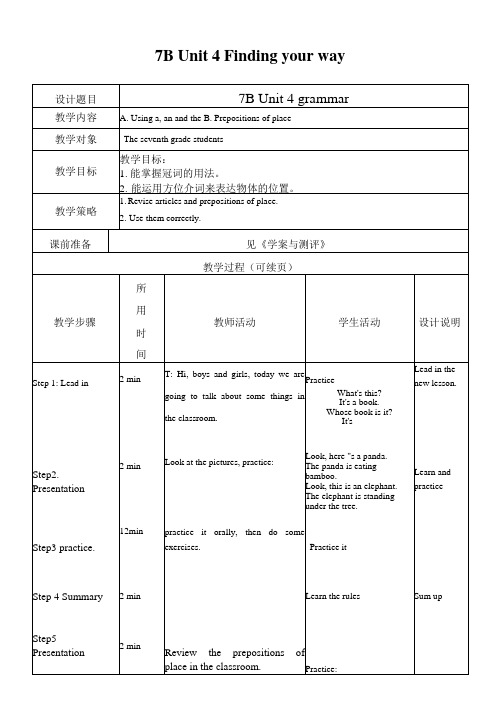
1.Revise articles and prepositions of place.
e them correctly.
课前准备
见《学案与测评》
教学过程(可续页)
所
教学步骤
用
时
教师活动
学生活动
设计说明
间
Step 1: Lead in
2 min
T: Hi, boys and girls, today we are
7B Unit 4 Finding your way
设计题目
7B Unit 4 grammar
教学内容
A. Using a, an and the B. Prepositions of place
教学对象
The seventh grade students
教学目标
教学目标:
1.能掌握冠词的用法。
2.能运用方位介词来表达物体的位置。
I often stand in front of you.
Where does ... sit?
She sits between A and B.
She sits in front of
C, and C sits behind her.
Learn the rules
Learn and
practice
going to talk about some things in
the classroom.
ice
What's this?
It's a book.
Whose book is it?
It's
Lead in the
new lesson.
译林版英语七年级下册Unit7学案
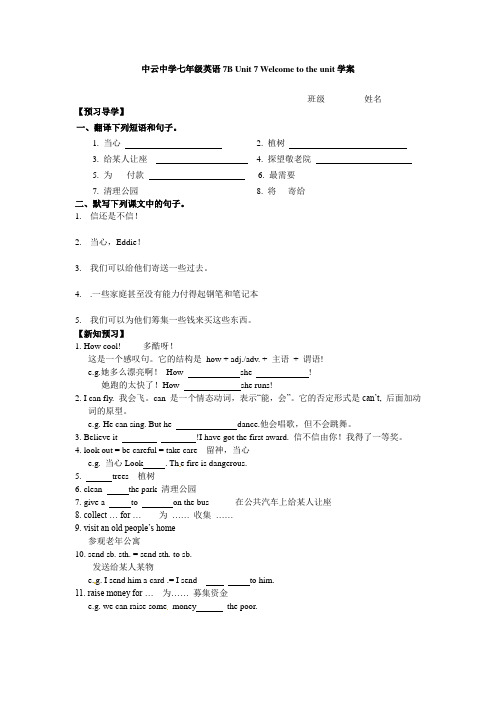
班级_________姓名_________ 【预习导学】一、翻译下列短语和句子。
1. 当心2. 植树3. 给某人让座4. 探望敬老院5. 为-----付款6. 最需要----- _______________________7. 清理公园_______________________ 8. 将----寄给________________________二、默写下列课文中的句子。
1.信还是不信!2.当心,Eddie!3.我们可以给他们寄送一些过去。
4..一些家庭甚至没有能力付得起钢笔和笔记本5.我们可以为他们筹集一些钱来买这些东西。
【新知预习】1. How cool! 多酷呀!这是一个感叹句。
它的结构是how + adj./adv. + 主语+ 谓语!e.g.她多么漂亮啊!How she !她跑的太快了!How she runs!2. I can fly. 我会飞。
can 是一个情态动词,表示“能,会”。
它的否定形式是can’t, 后面加动词的原型。
e.g. He can sing. But he dance.他会唱歌,但不会跳舞。
3. Believe it !I have got the first award. 信不信由你!我得了一等奖。
4. look out = be careful = take care 留神,当心e.g. 当心Look . Th e fire is dangerous.5. trees 植树6. clean the park 清理公园7. give a to on the bus 在公共汽车上给某人让座8. collect … for … 为…… 收集……9. visit an old people’s home参观老年公寓10. send sb. sth. = send sth. to sb.发送给某人某物e.g. I send him a card .= I send to him.11. raise money for … 为…… 募集资金e.g. we can raise some money the poor.班级_________姓名_________一、用所给首字母完成下列句子。
新译林版七年级下册英语 Unit 7 课时4 教案(教学设计)

Unit 7 AbilitiesGrammar1.To recognize and understand how to use can and could to talk about ability in thepresent and past.2.To recognize and understand how to use can and could to talk about Possibility inthe present and past.3.To recognize and understand how to use can, could and may to ask for permission.1.How to recognize and understand the use of “can, could and may”.2.The use of “can, could and may”.Step 1 RevisionRevise the last lesson.Step 2 Warm-upAsk the student on duty to give a free talk.Step 3 Presentation1. Revise the key vocabulary about leisure activities and introduce “row a boat/ride a bike /fly a kite “Talk to students about summer camps in general and the type of activities offered. Elicit as much real information from students as possible .2. Students have already learned the use of “can” and “may” in making requests. Therefore, you need to introduce the idea that the word “can” is used to expressability.Step 4 Practice1. Ask students to identify activities that they can do well. Write students’ statements on the board. First write “I can” on the board.2. Ask students to say the things they can do, and sort them into categories: sports/ school subjects3. Explain the use of “can/could” and their negative forms. We use “can” to say that we are able to do something. We use “could” to say that we were able to do something in the past.4. Ask students to work out the rule on their own. Then they check with a partner and confirm that their answer is correct with the whole class.5. Ask students to check the informationStep 5 Practice1. Reinforce the use of “could/ could not” for the past and “can/can not” for the present. Then they complete some sentences on their own.Step 6 Presentation1. Say:---Can I borrow your pen?---Yes, you can.---Could I smoke here?---Sorry, I am afraid you can not.---May I use your pen? Of course you may.---Sorry, I am afraid you can not.2. Show the sentences above on the screen and explain them to the students: We use “can \could\may” to ask for permission.Step 7 PracticeStep 8 Summary1. Review the contents of this lesson.2. Finish the exercises in the workbook.。
牛津译林版七年级英语下册unit7第4课时教案(无答案)

牛津译林版七年级英语下册7B Unit7 课时:4 主备人:一、课前预习导学一)教学目标1. 通过反义词扩大词汇量2.了解不同语境中形容词的用法3.用形容词描述人的性格.行为二)预习下列词汇.helpful --- unhelpful brave --- afraid happy --- unhappy gratefulful --- ungraeful polite ---rude careful --- careless kind --- unkind三)翻译下列词组:1. be good at2.spend …on/in3.fall down4.have the award5.think of6.would like to…三)句型: He always think of others first.:二、课堂合作交流一)根据课文内容回答下列问题:T : Is Daniel an unkind student ?S : No , he is kind .T : Is Daniel a rude student ?S ; No , he is polite.T : Is Daniel a careless studentS ; No , he is careful.I want to recommend Daniel for the Grade 7 Most Helpful Student Award .让学生通过回答问题来回忆以前学过的形容词1.I would like to recommend Daniel for the Grade 7 Most Helpful Student Award.2..recommend sb for sth 推荐某人获得某物eg . I like to recommend Jim for the job.我想推荐Jim 获得这份工作.recommend sb sth/recommend sth to sb 把某物推荐给某人eg . Liumei recommended we this job.刘梅把这份工作推荐给了我们.recommend sb to do sth 推荐某人做某事eg . They recommended me to buy a new bike .他们推荐我买一辆新自行车.2 . He always thinks of others .‘think of ‘ 想, 考虑eg . Lucy thought of herself to much.Lucy 为自己考虑的太多.3 . He spends a lot of time at the Helping Hands Club.1)‘spend ‘ 花费,度过eg . Mr Green spent 3 weeks with his family. Green.2)‘spend …on …eg . Nick spends lots of time on his homework everyday .3)‘spend…(in) doing sth ‘花费时间做某事eg . Nick spends lots of time (in) doing his homework everyday.4 . He is also good at swimming.be good at sth / be good at doing sth 擅长做某事eg .Mille is good at basketball./ Mille is good at playing basketball.Mille 擅长打篮球.三、课内练习巩固写出下列各词的反义词1.slow____2.rude_____3grateful____4.afraid____5.helpful___6.kind___7.careful___8.happy___9.short___10.closed___四、课后拓展延伸A . 用所给词的适当形式填空1 . Jim always helps others , he is a ____ (help ) student .2 . Lucy was afraid of the fire but lilei was ___ ( afraid ) .3 .They spend 3 hours in ____ ( do ) their homework everyday .4 .Today is Lily’s birthday, she is very ___ ( sad ) .5 . Nick is good at ___ ( play ) football .6 . We all want to recommend Simmon ___ ( do ) this job .B . 单项选择1 . She is good ____ Maths .A. for B .at C . to D . in2 .We spend half an hour in ____ everyday .A . runs B. run C. running D. ran3 . They would like to _____ shopping now .A.goB.goingC.wentD.goes五、教学效果验收1、错题警报2、错因分析3、矫正补救4、教与学反思(教师与学生分别从不同角度)。
译林版七年级英语下册Unit 7 Grammar教案

10. What surprising news they are watching!
11. What a strong man he is!
12. What fine weather it is!
II. Do the same things as the same way above.
2. How wonderful!
What a wonderful program!
3. What a big fire!
How big the fire is!
4. What a brave young man!
How brave the young man is!
5. How dangerous the fire is!
Step 4 Presentation
1. Arouse Ss’ interest in how to praise Zhang Hua with strong feelings in Chinese or English.
2. Lead into the new item: to use the Imperative Sentences to express strong feelings. Sum up Ss’ answers on the Bb.
2. Make more able Ss to give their own sentences in class.
Step 6 Production
Finish off the conversation in pairs.
A. Do you know about Zhang Hua?
B: Yes, Of course. He helped his neighbour out of a fire.
译林版七年级下册英语Unit 7 Grammar课时练习(包含答案)
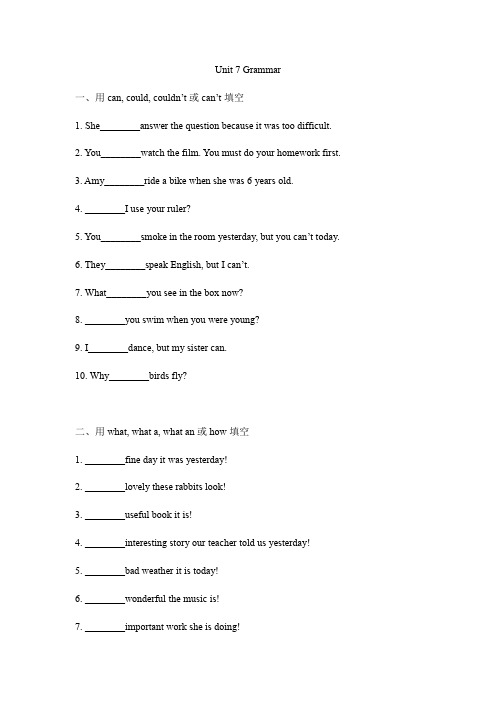
Unit 7 Grammar一、用can, could, couldn’t或can’t填空1. She________answer the question because it was too difficult.2. You________watch the film. You must do your homework first.3. Amy________ride a bike when she was 6 years old.4. ________I use your ruler?5. You________smoke in the room yesterday, but you can’t today.6. They________speak English, but I can’t.7. What________you see in the box now?8. ________you swim when you were young?9. I________dance, but my sister can.10. Why________birds fly?二、用what, what a, what an或how填空1. ________fine day it was yesterday!2. ________lovely these rabbits look!3. ________useful book it is!4. ________interesting story our teacher told us yesterday!5. ________bad weather it is today!6. ________wonderful the music is!7. ________important work she is doing!8. ________hard they are working in the field!9. ________great fun they had last night!10. ________well the girl is playing the piano!三、用所给单词的适当形式填空ability, nod, make, bad, can1. The dog is a wonderful animal with some amazing________.2. I________speak English well at the age of seven.3. The little boy kept________when his mother spoke.4. How________we did in the match!5. Wow, the cake tastes bad. Who________it?四、单项选择( ) 1. -________I keep the book for a week?-Sorry, I’m afraid you________.A. Need; couldn’tB. Need; can’tC. May; couldn’tD. May; can’t( ) 2. -Some people don’t show their talents at the very beginning.-I agree. Even Einstein________read until he was seven.A. can’tB. mustn’tC. couldn’tD. needn’t ( ) 3. -________wonderful the music is! What’s its name?-Victory.A. HowB. How aC. WhatD. What a( ) 4. ________nice weather it is! Let’s go for a picnic, Frank.A. WhatB. What aC. HowD. How a( ) 5. -Could you help me carry the equipment to the basketball field, Robin?-________. I’ll do it at once.A. Not at allB. No problemC. Wait a momentD. That’s right五、按要求改写句子,每空一词1. A kite can fly like a bird.(改为一般疑问句并作否定回答)-________a kite fly like a bird?-No, it________.2. She is a very kind young teacher.(改为感叹句)________ ________the young teacher is!________ ________ ________ ________ ________she is!3. How difficult these questions are!(改为同义句)________difficult questions________are!4. The classroom is very bright.(改为感叹句)________ ________the classroom is!5. Zhang Hua was at home by himself.(改为感叹句)Zhang Hua________ at home________.六、根据短文内容及首字母提示,填写所缺单词,使短文意思完整,每空限一词Are you looking for something fun and would you like to help others when you’re free? Then j________us to be a volunteer! We have voluntary work for all ages. Anyone, from twelve-year-old children to people in their seventies, can b________a volunteer.You can help people in m________ways. Schools need help in taking care of children while parents are working. H________need volunteers to look after children while their parents are seeing a doctor. Animal lovers can help take care of those dogs and cats w________homes. There is something for everybody.1. ________2. ________3. ________4. ________5. ________答案一、1. couldn’t 2. can’t 3. could 4. Can 5. could6. can7. can8. Could9. can’t10. can二、1. What a 2. How 3. What a 4. What an 5. What6. How7. What8. How9. What10. How三、1. abilities 2. could 3. nodding 4. badly 5. made四、1-5 DCAAB五、1. Can, can’t 2. How kind, What a kind young teacher3. What, they4. How bright5. was, alone六、1. join 2. be/become 3. many 4. Hospitals 5. without。
牛津译林版英语七年级下册U4Grammar教案

牛津译林版英语七年级下册U4Grammar教案《英语》(七年级下册)Unit 4 Finding Your WayGrammarI. Teaching aims and learning objectivesBy the end of the lesson, students should be able to:1. know how to use a, an and the;2. use prepositions of place properly.II. Teaching contentsNew words and phrases: across, inside, outside, above, below, sign, over, bench, go across thebridge, inside/outside the shop, above the drinks, below the food,over/under the bench,III. Focus of the lesson and predicted area of difficulty1. Know how to use a, an and the.2. Use prepositions of place properly.IV. Teaching proceduresA Using a, an and theStep 1 Lead-inT: Hello everyone. What animals did the students see in Sunshine Zoo? Choose one of the animals on the screen to talk about. Tell us where we can see them and what they are like.T: Here are some sentences about those animals. Look at these sentences and pay attention to the blue nouns and red a, an and the.【设计意图:通过回忆之前所学,导入冠词这个新课主题,让同学们意识到冠词在句子中几乎随处可见,为下面讲解冠词用法做铺垫。
牛津译林版英语七年级下册Unit4 Grammar精品教案

Unit4 Grammar精品教案Teaching Aims:1. Introduce the usage of a, an and the.2. Learn some prepositions of place.Step 1. PresentationEnjoy a picture and present the new word ‘cage’.Step 2. Warming upEnjoy more pictures and talk about the usage of a, an and the.Step 3. Explanation不定冠词a / an 的用法1.第一次提到某人或某物时。
I have a book.2. 泛指某一类的人或物。
A panda is very lovely.判断一个单词用a还是用an,是根据其读音,而不是根据其首字母。
以元音音素开头的词前用“an”,以辅音音素开头的词前“a” 。
如:an hour, an apple, an elephant, a useful book等。
定冠词the的用法1.指上文提到过的人或物。
如:Lucy bought a new bike. The bike is green.2.世界上独一无二的事物。
如:the sun the moon3.谈到彼此都知道的人或事物。
如:Open the door, please.4.序数词和形容词最高级前。
如:She is always the first to get to school.5.乐器名词前用。
play the piano play the violin6.定冠词与形容词连用表示“一类人”,加在姓氏前面表示“一家人”。
the rich the young7.某些专用名词和习惯用语中用定冠词。
the Great wall by the way不用冠词的情况1名词前已经有指示代词(this, that, these, those)、形容词性物主代词(my, his, our …)或名词所有格等限定词。
译林版英语七年级下册_Unit7_Grammar名师教案

Unit7 Grammar名师教案I. Teaching aims and learning objectivesBy the end of the lesson, students should be able to:1.learn how to use “can”, “could” and “may”;e “what” and “how” to express strong feelings.II. Teaching contents1.New words and phrases: smoke, camera, X-ray, by the way, no problem2.New sentences: How dangerous!What a brave man!III. Focus of the lesson and predicted area of difficultyLearn how to use “can”, “could” and “may”.IV. Teaching proceduresA Using can, could and mayStep 1 Lead-inT: Boys and girls, today we are going to learn Grammar of Unit 7. Do you know these sports? Can you tell me their names?S: Swimming, playing badminton, cycling, horse riding and flying kites.【设计意图:从学生喜欢的体育运动导入本节语法课,为下面的新授课作铺垫。
】Step 2 Presentation1. Use can or could to talk about ability(1) Describe what you see in the picture.She could not ride a bike at ten, but now she can ride a bike.The girl is skating. She could not skate last year, but now she can skate.We can also say: She wasn’t able to skate last year, but now she is able to skate.(2) Look at more pictures and use can/could/be able to to describe them.(3) Work in pairs and make up a dialogue according to the table.【设计意图:由学生的个人操练过渡到两人对话,设计不同的任务让学生反复操练can、could、be able to。
Unit7第4课时Grammar(教案)2023-2024学年七年级下册英语牛津译林版(安徽专版)

3. 实物道具:使用实物道具,如图片、卡片等,帮助学生直观地理解一般现在时态的用法,提高学生的学习兴趣。
4. 在线学习平台:利用在线学习平台,让学生在课后自主学习一般现在时态的知识,提高学生的自主学习能力。
例题6:
题目:请用一般现在时态描述你最喜欢的动物。
答案:My favorite animal is a dog. Dogs are loyal and friendly. They can be good companions.
例题7:
题目:请用一般现在时态描述你的家庭生活。
答案:My family lives in a cozy house. We have dinner together every evening. We often go on trips during holidays.
5. 情境模拟:创设真实的语境,让学生模拟使用一般现在时态进行交流,提高学生的实际运用能力。
教学实施过程
1. 课前自主探索
教师活动:
- 发布预习任务:通过在线平台或班级微信群,发布预习资料(如PPT、视频、文档等),明确预习目标和要求。
- 设计预习问题:围绕一般现在时态的肯定句、否定句和疑问句的结构,设计一系列具有启发性和探究性的问题,引导学生自主思考。
3. 素质层面:学生具备一定的自主学习能力和合作学习能力,能够主动参与课堂活动。但在自我约束和时间管理方面,部分学生可能存在不足,容易导致学习效果不佳。因此,在教学过程中,需要引导学生养成良好的学习习惯,提高自我管理能力。
4. 行为习惯:学生在课堂上的注意力集中程度不同,部分学生可能存在注意力不集中的现象。这可能会影响他们对一般现在时态知识的学习和掌握。因此,在教学过程中,需要采取有效的教学方法,吸引学生的注意力,提高课堂参与度。
牛津译林版初中英语七年级下册Unit7第3课时Grammar导学案

牛津译林版初中英语七年级下册Unit7第3课时Grammar导学案7B Unit 7 Abilities (第3课时)Grammar 问题导学单【教学目标】教学目标a.掌握重点单词smoke, camera, X-ray. b.掌握重点词组by the way, no problem., go camping, special eyes. c.学会使用can/could谈论能力,学会使用can/could/may请求许可。
d.学会使用感叹句。
教学重点a. 用can/could谈论能力,用can/could/may请求许可 b. 感叹句教学难点感叹句的用法一、同义句转换 1. What a pretty girl she is! _______ _______ the girl is! 2. How difficult the questions are! _________ ________ ________ they are. 3. How big the factory is! _______ _______ big factory _____ ____! 4.What a clever boy! _______ _______ the boy _______! 5. How tall the trees are! _______ tall trees ______ ______! 6. What interesting books they are! ________ _______ the books ________! 7. How funny the girl is! ________ a funny girl she is! 二、预习课本P85-86的内容。
Those who turn back never reach the summit.(回头的人永远到不了高峰。
) 教师评价日期家长签名问题导学单一、用can, can’t, could, couldn’t, may, must, mustn’t填空 1. _______ you swim? Yes, I________. 2. She ____________ play tennis when she was 10. 3. He knows little English, and ____________ understand the story. 4. They can row a boat now, but two days ago, they_____________. 5. What _______I do for you? 6. Fire ________ be dangerous if we are not careful. 7. We ________ play football yesterday because it snowed. 8. —_______ you row a boat now?—Yes, I ____. But last year I ____. I practiced very hard and now I _______ teach you. 二、情态动词can 表示现在的能力,could 表示过去的能力,后跟动词原形,can do sth.=is/ am/ are able to do sth. could do sth.= was/ were able to do sth. 不能做某事can/could not do sth.= be not able to do sth.= be unable to do sth. 他们英语说的很好。
牛津译林版英语七年级下册Unit7Grammar教学设计
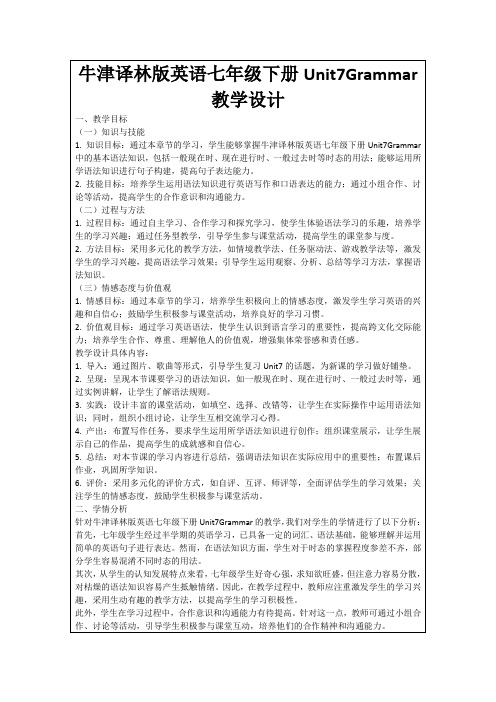
在学生小组讨论环节,我将组织以下活动:
1.将学生分成若干小组,每组选择一个话题,如“daily routines”、“favorite activities”等,要求学生用英语讨论并记录下组员的日常活动和兴趣爱好。
2.每个小组派代表分享讨论成果,其他小组认真聆听并给予评价。通过这个环节,学生可以互相学习,提高自己的语法运用能力。
3.课堂实践:设计填空、选择、改错等练习,让学生在实际操作中运用所学语法知识;同时,组织小组讨论,让学生互相交流学习心得。
4.产出环节:布置写作任务,要求学生运用所学时态知识进行创作;组织课堂展示,让学生展示自己的作品,提高他们的成就感和自信心。
5.总结与反馈:对本节课的学习内容进行总结,强调语法知识在实际应用中的重要性;对学生的课堂表现进行评价,指出优点和不足,提出改进建议。
(二)过程与方法
1.过程目标:通过自主学习、合作学习和探究学习,使学生体验语法学习的乐趣,培养学生的学习兴趣;通过任务型教学,引导学生参与课堂活动,提高学生的课堂参与度。
2.方法目标:采用多元化的教学方法,如情境教学法、任务驱动法、游戏教学法等,激发学生的学习兴趣,提高语法学习效果;引导学生运用观察、分析、总结等学习方法,掌握语法知识。
2.提问学生:“Can you tell me what you usually do with your family?”让学生用英语分享自己的日常活动,从而自然引入一般现在时的概念。
3.通过歌曲、游戏等形式,让学生复习一般现在时的动词形式,为新课的学习做好铺垫。
(二)讲授新知,500字
在讲授新知环节,我将结合课本内容,采用以下方法帮助学生理解和掌握语法知识:
二、学情分析
【译林版七年级英语下册教案】Unit 7 Grammar

GrammarTeaching aims:1. Introduce the usage of can, could and may.2. Using What and How to express strong feelings.Step 1 PresentationPresent the pictures and learn the new words.Step 2 Usage of can, could and may1. Enjoy more pictures and talk about the usage of can and could.2. PresentationUsing “can”/ “could” to talk about ability.W e use “can” to talk about present ability.W e use “could” to talk about ability in the past.e.g. Millie can speak good English.Shirley cannot ride a horse.The old man could swim across the Yangtze River.We use can, could or may to ask for permission. Could sounds more polite than can. May is formal.e.g. — Can I borrow your bike, Millie?— Yes, you can. Here you are.— Could I smoke here?—Sorry, I’m afraid you can’t.— May I use your mobile phone?— Of course you may.3. Explanation1) can与couldcan常用于口语中, 表示非正式的请求, 请求对象一般是家人或朋友。
Unit 7 Grammar 课时教案牛津译林版七年级英语下册
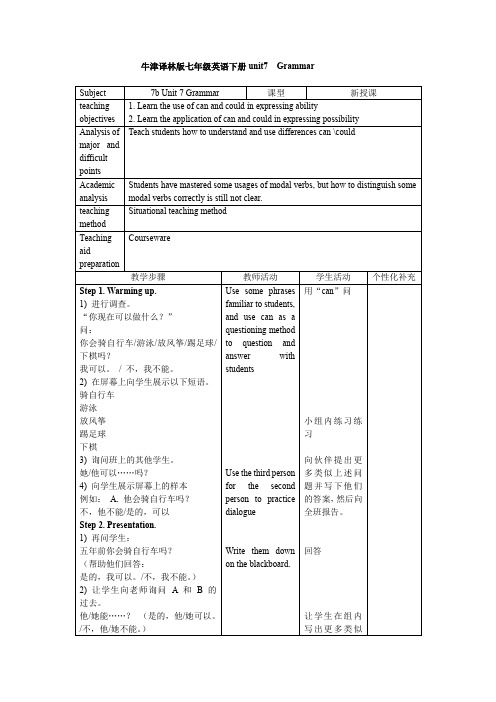
小组内练习练习
向伙伴提出更多类似上述问题并写下他们的答案,然后向全班报告。
回答
让学生在组内写出更多类似的句子
总结can与could的区别
报告自己自由谈论表格。成对。
理解
举例说明
回答这些句子并制作更多
完成单选练习
猜测
总结
Job design
Supplementary exercises
Synchronous Guidance
例如。桑迪现在可以划船了吗?
他去年能做到吗?
3)完成A2部分的对话。
5)说明:
我们可以使用am (is , are)能够替换can并且was (were)能够替换can。
eg.①麦克会唱20多首英文歌曲。
迈克能够……
②她四岁时会说英语。
她能够……
Step 4.ask
1)问学生
我可以借你的钢笔用下吗?
typography design
He can’t / cannot swim.…
Shecould ride a bike five years ago.
He couldn’t swim five years ago.
Can I borrow your pen ?
Can I open the window ?
Use some phrases familiar to students, and use can as a questioning method to question and answer with students
Use the third person for the second person to practice dialogue
牛津译林版七年级英语下册unit7第4课时导学案(无答案)

牛津译林版七年级英语下册unit7 第四课时[学习目标]你会使用形容词来描述一个人吗?请试着使用下列词语来描述你身边的同学、朋友、老师。
勇敢__________ 乐于助人__________友善__________ 细心__________小心__________ 有礼貌的__________感激的__________ 快的__________开心的__________[课前自主学习]重新排列括号内的字母顺序完成下列句子1.Miss Cao is _____(idkn) to all students and everyone in her class likes her.2.I often forget something .I don’t have a good _____(rommey)3.He likes ______(ctecoll) stamps very much.4.The old woman was _____(gaetrafl) for his help.5.Be ______(fluarec) when you cross the street.[体验与实践]1).预习情况交流回答下列问题:1.Who does Simon would like to recommend for the Grade 7Most Helpful StudentAward? And what about the Grade 7 Best Sportswoman Award?2.Where does ChenDan spend a lot of time ?3.Why do the other members of the club like him very much?4.What is Zhao Aijia good at?5.Who saved Mrs Lu last week?2). 重点热点点击词组互译1.一个乐于助人的学生___________2.fall into _____________-3推荐…..为……______________ 4.think of_____________5游泳俱乐部成员________________ 6.play water sports_____________ 7擅长跑步_____________ 8.the Sportsman Award_____________9去年__________________ 10.be grateful for_____________3).目标达成检测一. 根据提示补全句子.1.Amy is a h________ girl, she never feels sad..2.Don’t be r________ to the others ,be polite!3.Liu Dehua is a s______ star. People all over the world like his films andsongs very much.4.Monkeys are q________ animals.5. A bus runs s_________ than a train.二.改错1He is kind for his students. ________2.Amy is a helpful girl, and everyone like her. ______-3.She would like recommending Mr. Li for the award. ________-4.The others members all take him. ___________5.Amy saved the old man , and he is grate for her help.__________三.翻译1.Daniel不但善良而且勇敢Daniel is not only _________ but also _________.2他为俱乐部做了许多电脑方面的工作。
译林版英语七年级下册_Unit7_Grammar1精品学案

Unit7 Grammar1精品学案一、【学习目标】1.能识别并理解如何使用can和could表示现在和过去的能力。
2. 能识别并理解如何使用can、could和may表示许可。
二、【学习重难点】1. 如何使用can和could表示现在和过去的能力。
2. 能熟练掌握本课生词、短语和句型。
三、【自主学习】翻译下面生词和短语顺便说一下_________骑马_______一个玩乐的好地方____________我能用你的手机打个电话吗?________________________四、【合作探究】1.预习情况交流2.引导学生学习书85页内容并小组讨论总结can、could和may用法。
①情态动词can/could+动词_______②can表示_____的能力,could表示____的能力(be able to也可以表示能力,be动词的形式根据句子所用时态变化)③也可以用can/could/may来表示________, _________语气比_______更委婉,更礼貌,may则较正式。
通常_____用于向朋友、同学等请求允许,______用于向老师、父母等请求允许。
3.引导学生完成书第85页练习并分角色朗读对话。
五、【达标巩固】用can, can’t ,could, couldn’t, may填空1.My brother______ play football well. He is a good player.2.The man ____ drive a car last year. But now he______ drive it3.My uncle______ speak English . He doesn’t know anything about it.5.I chatted online with my friend in England. We _clearly hear each other.6.—___ you make a model ship when you were in Grade 2? —No, I ______。
- 1、下载文档前请自行甄别文档内容的完整性,平台不提供额外的编辑、内容补充、找答案等附加服务。
- 2、"仅部分预览"的文档,不可在线预览部分如存在完整性等问题,可反馈申请退款(可完整预览的文档不适用该条件!)。
- 3、如文档侵犯您的权益,请联系客服反馈,我们会尽快为您处理(人工客服工作时间:9:00-18:30)。
Unit7 Abilities
Grammar
学习目标:
识别并理解如何使用can和could的表达现在和过去的能力
识别并理解如何使用can和could表达现在和过去的可能性
掌握what和how构成感叹句的方法
能使用简单的what和how感叹句表达惊讶、愤怒、赞美等情绪
重点单词词组:smoke, by the way, camera, no problem
重点句子:
Millie can/can not speak good English.
The old man could swim across the Yangtze River.
--- Could I smoke here ? --- Sorry, I’m afraid you can’t .
---May I use your mobile phone ? ---Of course you may .
--- Can I borrow your bike, Millie? ---Yes, you can. Here you are.
What a beautiful flower !
How beautiful the flower is !
语法要点:
一.can、could和may用法
1. 情态动词can 表示现在的能力,could 表示过去的能力,后跟动词原形,can do sth.=is/ am/ are able to do sth. could do sth.= was/ were able to do sth.
不能做某事can/could not do sth.= be not able to do sth.= be unable to do sth.
2.情态动词could 表示委婉语气,比用can 更加有礼貌,may 比较正式。
一般疑问句回答,通常情况问什么,答什么Can I …? Yes, you can. No, you can’t.
请注意下列特殊情况:Could I …? Yes, you can. No, you can’t.
May I …? Yes, you may. No, you can’t. (坚决拒绝No, you mustn’t.)
Must I …? Yes, you must. No, you needn’t.
3.表示可能性may be也许是,(50%)must be一定是,(100%)can’t be 不可能是(0%)。
二.感叹句
1. 用what构成感叹句是,what作名词修饰名词。
1) What + a(n) + 形容词+单数可数名词(+ 主语+ 谓语)!What an exciting game it is!
2) What + 形容词+ 复数名词(+ 主语+ 谓语)!What interesting books they are!
3) What + 形容词+ 不可数名词(+ 主语+ 谓语)!What bad weather it is today!
2. 用How构成感叹句时,How做状语修饰形容词或副词。
How + 形容词/副词+ 主语+ 谓语!How beautiful the dress is!
3. What引起的感叹句都可以转换为how引起的感叹句
1) What good news it is! ---How good the news is!
2) What beautiful flowers they are! ---How beautiful the flowers are!
课堂检测:
一、用can, can’t ,could , couldn’t, may填空
1.My brother______ play football well. He is a good player.
2.The man _______drive a car last year. But now he______ drive it.
3.My uncle__________ speak English . He doesn’t know anything about it.
5.I chatted online with my friend in England. We ______clearly hear each other.
6.—___________you make a model ship when you were in Grade 2?
—No, I ___________
二、单项选择
( ) 1. —Help, Help! There’s a sound _______ a ghost in the bushes.
—Don’t worry! It’s just a weak cat. It ________ hurt you.
A.likes / can
B. liked / can’t
C. is liking / isn’t
D. like / can’t
( ) 2. —When did you find the missing girl?
—When I saw her, she was crying in the street. She said her mother was ill in ______ and she _______
find the way to the hospital.
A.hospital / can’t
B. the hospital / couldn’t
C. the hospital / can’t
D. hospital / couldn’t
( ) 3. Millie can’t ride a bike very well. Please don’t jump on her bike suddenly while she is riding, or she will ______.
A.fell down
B. felled down
C. felt down
D. fall down
( ) 4. Don’t make such a big noise. I ________ the teacher clearly.
A.can listen
B. can listen to
C. can’t listen to
D. can’t hear
( ) 5. Millie always plays tricks on her classmates. She likes telling ghost stories to them. However, they are so brave that she ________ frighten them.
A.never can
B. can never
C. always can
D. can always
三、翻译句子
1. ——去年他会骑车吗?
——不会, 但他现在会了.
—_________ he ride a bicycle last year?
—No, he ________. But now he ________.
2. 昨天他们没能游泳, 因为下雨了.
They ___________ __________because it __________yesterday.
4.——谁会唱这首歌?
——汤姆可能会唱, 但我不能确定.
—Who __________ sing this song?
—Tom ___________. But I am not sure.
4. 我确信我们能解决所有的数学题.
I’m sure we ____________ work out all the Maths problems.
5. 医生说他对这位老太太无能为力.
The doctor said that he ____________ do anything for the old woman.
6. 他们不能去时装展.他们这个周末太忙了.
They ____________ go to the fashion show. They are too busy this weekend.
答案:
一、
1.can
2.couldn’t; can’t
3. can’t
4. can
5. could
6. couldn’t
二、1--5 DADDB
三、
1.Could; couldn’t; can
2. couldn’t swim; rained
3. can; can
4. can
5. can’t
6. can’t。
